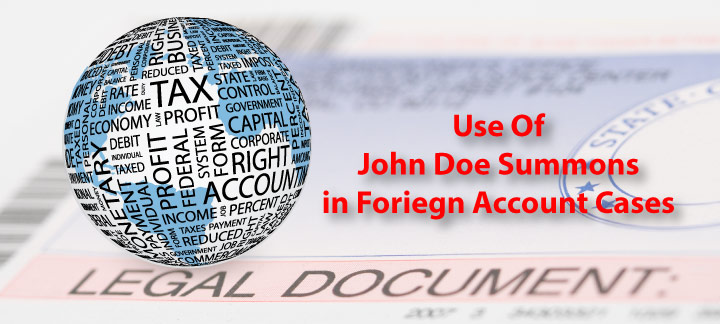Use of John Doe Summons in Foreign Account Cases
Sometimes, the IRS may use a John Doe summons to obtain information about the taxpayer whose international tax liability it is trying to determine. A John Doe summons is used when the IRS believes tax is owed, but does not know the exact identity of the individual who owes the taxes.
Requirements to Use a John Doe Summons
In order to use a John Doe summons, the IRS must meet certain requirements. The primary requirement which must be met before a summons can be served is that the IRS must obtain district court approval. The description of the John Doe summons is found in IRC § 7609, subsection (f) of which states that IRS must establish particular showings in an ex parte court proceeding. First, the IRS must show that the John Doe summons relates to an ascertainable group of persons. Next, the IRS must show that a reasonable basis exists for believing that the group of persons have failed to comply with the revenue laws. Third, the IRS must establish in the ex parte hearing that the information sought, including the identity of the individuals involved, is not available from other sources.
What is an Ascertainable Group of Persons for the John Doe Summons?
IRS § 7609 requires that the John Doe summons relates to an ascertainable group of persons. The IRS has established that the unidentified person, group or class of persons under investigation, and the activity or transaction under investigation must be described with particularity in the summons. The phrase “group or class” refers to a group or class of persons who have engaged in specifically described transactions or activities that are common to all persons or entities in the group or class.
How Does the IRS Establish a Reasonable Basis?
The second requirement of the John Doe summons is that the IRS must establish a reasonable basis exists for believing that the particular individuals involved have failed to comply with the U.S. revenue laws. To establish this requirement, the IRS does not need to actually show a probable cause for suspecting noncompliance because that is a higher standard than the reasonable basis requirement. According to IRC § 7609(f)(2), the IRS can establish reasonable basis one of two ways: 1) by showing that the unidentified person has engaged in or is engaging in a transaction or transactions that the Internal Revenue Service has determined to be noncompliant with the tax laws; or 2) by showing that the unidentified person or group has engaged in or is engaging in an activity or course of actions that is of such a nature that there is a likelihood of tax attorney. A tax attorney experienced in offshore compliance will ensure that your accounts are compliant moving forward, something that the IRS will want you to demonstrate.
The Tax Lawyer - William D. Hartsock has been successfully helping clients comply with U.S. International Tax Laws and deal with issues related to worldwide taxation since the early 1980s. Mr. Hartsock offers free consultations with the full benefit and protections of attorney client privilege to help people clearly understand their situation and options based on the circumstances of their case. To schedule your free consultation simply fill out the contact form found on this page, or call (858) 481-4844.



Comments (0)